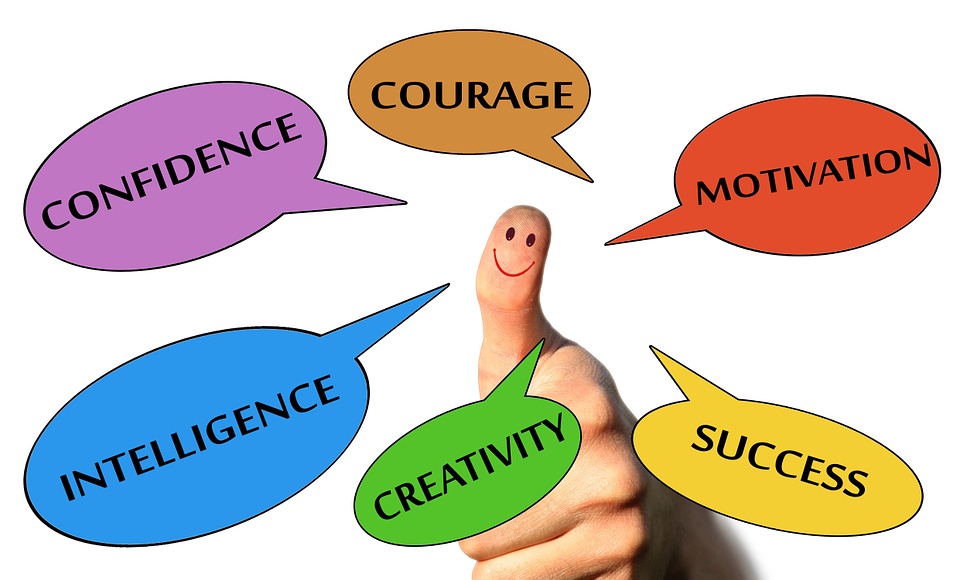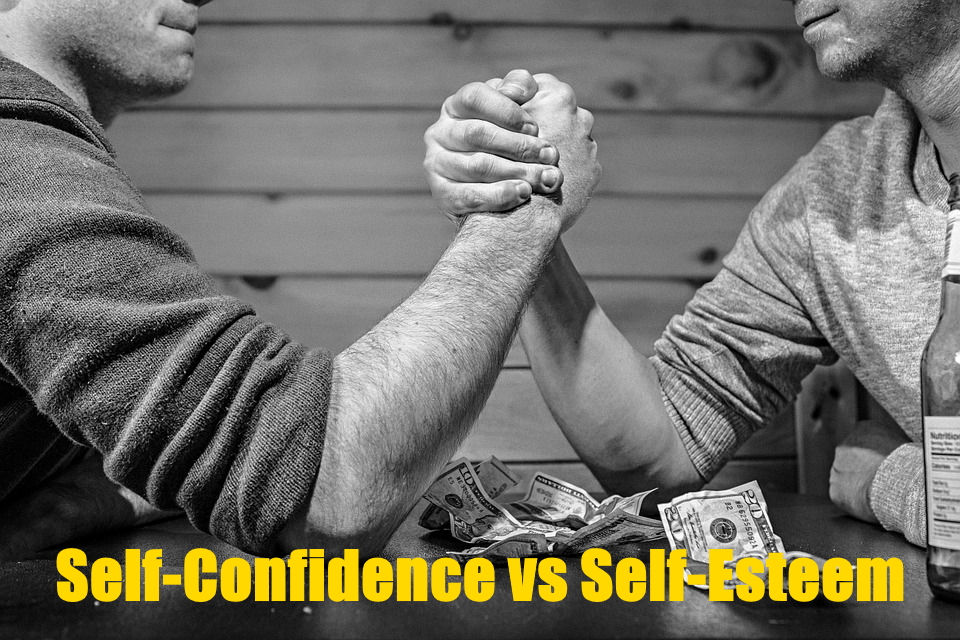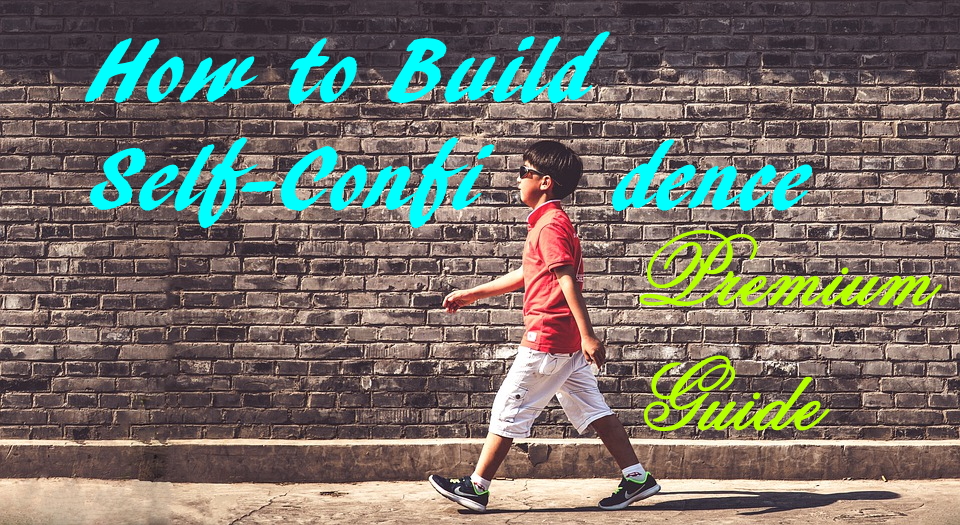Guide How To Build Your Self-Confidence And Self-Esteem

Building your self-confidence and keeping your self-esteem high is probably a debate that has been held for years. Such are concepts that are known for generations. If you recall the memories, you would surely be able to remember the time when you were introduced to the importance of self-confidence during the very early years of academia. Then you graduated and went for a high school and found out that the entire orientation speech was focused on building self-esteem as well. But that wasn’t the end of it. To date, wherever you go, be it in a different institute or a new workplace, an unshakable self-confidence serves as the prerequisite for success.
What’s unfortunate is that such debates are held over and again, at every other stage of life, but hardly anyone wants to make it practical by actually highlighting the tips and strategies which can work to enable an academic or a professional to improve his self-confidence. No, you don’t have to be embarrassed or feel guilty for having doubts about yourself and your abilities since you have always been introduced to the importance of self-confidence and not the actual path that you must take to get to your destination.
If you identify yourself as someone who has issues with self-confidence and are convinced that it is preventing you from unlocking your true potential, then you have landed on the right page. We understand the frustration of not getting a good night’s sleep for a mere reason of having an important presentation the next morning at work. How many times are you going to miss on an opportunity of getting a date with someone decent just because you didn’t have the confidence to ask them out? Is there going to be a time when the world would finally get to know the amazing ideas that run through your mind but remains always silent because you don’t have it in you to step on the podium, look into their eyes, and share it with them?
If above or related are a few of the issues which you experience from time to time, then know that it is time for you to work on building your self-confidence. Don’t worry, though. You are not the only one on the planet who is yet to find his inner confidence and call it into action. As a matter of fact, a survey on a representative sample has established that as much as 85 percent of the population is currently suffering from an issue of self-doubt. But congratulations on deciding to fix things for yourself. With such a decision, you are already past the stage 1 and it is now only a matter of time before you find yourself leaving the category of the aforementioned 85 percent and getting into the rest of the top 15 percent.
Our experts have worked diligently to craft this guide that accentuates all crucial components of self-confidence. We don’t want to overwhelm you with diving straight into what you can do to improve your self-confidence starting from today. Remember, improvement always begins with understanding the fundamentals and grasping the concept thoroughly. Having said that, our guide will inform you about the basics of what it means to have self-confidence, what could be the possible reasons behind self-doubt, and what is it that you can do to overcome it? So, are you ready to work with us in extracting your self-confidence from within yourself and unlocking your true potential? Without further ado, let’s begin the journey then.
Self-Confidence – What Does It Actually Mean and Take?

In all honesty, self-confidence is [restrict] kind of a grey area for even the researchers. Not because it’s something that they don’t understand, but merely because different professionals go to various depths when it comes to defining self-confidence. For instance, in the simplest of terms, some may tell you that have a belief in yourself is commonly known as self-confidence. Others, however, would associate it with the performance-based expectations that you have from yourself as well as regular evaluation of how well you are meeting such expectations.
But we are here to make things simpler for you. In no way is our aim to make things more complicated than they have to be. Psychologically speaking, therefore, self-confidence is defined as our inner assurance that enables us to have a strong faith in our own abilities, judgments, and capacities. The inner voice that constantly reminds that you have it in you to accomplish the task at hand up to perfection. Simply put, trusting your abilities for making you successful with whatever it is that you set your mind to, is the essence of having self-confidence.
Remember that self-confidence goes way beyond a simple belief. Truth is, a belief is a very personal concept. If self-confidence was confined to the inner beliefs only, you would never be able to identify a confident individual when you met one. And yet you have a Mark or perhaps a John, or maybe a George at work that you know for sure is a confident individual. It is because self-confidence usually reflects in one’s thoughts, ideas, words, feelings, emotions, and actions. You can never be sure of someone’s beliefs unless you get access to his mind, but his words and actions will always leave a hint about whether or not he feels self-confident. So self-belief is a crucial component of self-confidence without which it is literally impossible to have the latter. But there are no guarantees of self-confidence unless it is reflected in your words, thoughts, and actions.
Self-Confidence VS Self-Esteem – How Do They Differ?

If you are like, well, almost all of us, you must have been using the terms self-confidence and self-esteem interchangeably. Not your fault since none of us usually take a step back to reflect how do these terms differ in reality? There is no argument over the fact that self-confidence and self-esteem are indeed related to each other and can be taken as the two primary components of a wider concept of your “Sense of Self”. But they decided to come up with two different terms which theoretically implies that there must be some difference between the two, right?
Absolutely, while both the terms are generally used to highlight how you feel about yourself, understanding the difference paves the way for your self-improvement by giving you a more wholesome view of one’s self. You can think of your self-esteem as the way you see yourself. What do you feel about your overall self in general? How much of love do you have for yourself? Do you run short on the positive regard for yourself at times or not? Such are the measures of self-esteem. More often than not, your self-esteem is shaped by the experiences of your life and the situations and scenarios that you have faced throughout.
Your self-confidence, on the other hand, is your view of your abilities and is firmly based on a given situation. It pertains to your belief that you can accomplish the task at hand as you have the required abilities to do it. An interesting thing to realize is that while both the self-confidence and self-esteem are closely related, it is possible to have one without the other. Let’s try to understand this with the help of an example.
It is possible for someone to think of himself as a loser, to be stuck in a constant loop of “I’m not good enough” thoughts. This particular individual can have a very firm belief that he or she is absolutely worthless. And yet, the same individual could be great at mathematics and be able to perform intermediary computations efficiently in mind without the need of a calculator or a relevant tool. It makes sense that the person knows and acknowledges the fact that they are good at math as well. In this example, if you look closer, you’ll realize that the “I’m not good enough” thoughts pertain to lower self-esteem. However, acknowledgment of being good at math relates to self-confidence in a particular niche, i-e, Mathematics. So, while this individual has low self-esteem, he is self-confident when it comes to playing with numbers.
The same is true the other way around. You may have very high self-esteem and yet your self-confidence may lack in a particular scenario, say for example, when it comes to the kitchen skills. Here’s the twist, though. We have established that self-confidence and self-esteem are actually two different concepts. We have also introduced you to how it is possible to have one while lack the other. However, both of the concepts are frequently found to be inter-dependable as well. If you have high self-esteem, there is a good chance that you will learn to be confident about your skills and abilities. On the other hand, if you are confident that you have an amazing set of skills and abilities, it is very likely that your self-esteem will rise eventually. As such, while you are working to improve one of the components of your sense of self, the other one is silently being improved as well without you being knowing. Ultimately, it optimizes your sense of self that is a deciding factor for personal happiness, satisfaction, and overall quality of life.
Self-Confidence And Self-Esteem Are Not External To One’s Self

An important thing to realize is that self-confidence and self-esteem are not external phenomena. It’s kind of a given since you have the word “Self” before both of these terms which imply that it is something that lies within yourself. Self-confidence is a broad concept with your feelings, thoughts, ideas, dreams, and contemplation, all of it being directed towards improving your self-confidence. As per the research, an average human mind is capable of handling as many as five to even nine different things simultaneously. When there’s that much going on inside your head at all times, there’s a potential that you’ll find it difficult to isolate your thoughts which are serving the purpose of promoting your self-confidence from the ones which fail to serve a purpose or worse, counteract your self-confidence.
Therefore, in an attempt to reinforce your self-confidence and bring it to the foreground, it is imperative that you realize its existence within yourself. No, it’s not something that you can purchase from a supermarket. It’s certainly not something that someone can pour into you. It is not dependent on external factors. You may have lived your entire life with a lack of self-confidence and yet, we are here to give you the good news that whether you realize it or not, you do already have self-confidence. It may be concealed, imprisoned, chained in the darkest dungeons of your mind, but it is there, nonetheless. Such is the only reason why it has not been able to work its wonder in your life so far. So, all you have to do is break the chains and let it rise to the occasion.
The moment you realize that you already have self-confidence and it is only concealed waiting for the curtains to rise for it to make an appearance is a moment you set half of it free. The other half will be unchained as you begin to put a deliberate effort with a focus on building your self-confidence with the help of the tried and tested tips and strategies which we will highlight in the later part of this guide.
Top 6 Reasons Why People Have Low Self-Esteem and Lack Self-Confidence
The reasons why people end up in the ditch of low self-confidence could be plenty. A few of the prominent ones, however, are stated below:

1. Being Unrealistic In Setting Goals
The first and the foremost reason why you as an adult can find it difficult to have self-confidence is that you have a habit of setting unachievable goals for yourself. Remember that you derive your confidence from the successful experience, achievements, and accomplishments of your life. Being unrealistic while setting goals dooms you by definition since you will lack achievements and accomplishments to derive your confidence in the long run. For instance, if you gained a little holiday weight and now that you are back to the routine life, you are looking forward to shedding it off and tone your body and give it the best possible appearance. What needs to be realized that people spend years of undying effort into shaping their body up to perfection. If you set a goal of getting there in a month or two, you are destined to fail. Such a failure will give a huge blow to your self-confidence.
2. Surrounded By Negativity
Believe it or not, sooner or later, you are consumed by whatever it is that you are surrounded with. Throughout different stages of our lives, we identify an authority figure in whom we place all of our trust to the extent of directing our own sense of self. For instance, children see their parents as a source of boosting their self-confidence. But what if the authority figure turns out to be overly harsh or unreasonably critical? What do you think is in the books for a child whose parents never found time to appreciate him for whatever he did? Or worse, what if they had such high expectations from their child that regardless of who hard he tried or how much an effort did he put in, it was just never good enough for them? Such negativity that slowly feeds it in your mind that you are a failure, a loser, or just not worth it in some way can devastate a person’s entire self-confidence in the long run. People who go through such an atrocity that can only be termed as abuse are more likely to have issues with self-confidence and self-esteem as they approach adulthood.
3. Hard Luck With Relationships
Truth be told, relationships have a stronger impact on our personalities and our lives in general than we’d like to believe. After all, if someone has had a constant stream of bad relationships, if things just never seem to work out for someone, and things start to appear as if they are never going to find their soul mate, how long do you think it’ll take for such an individual to eventually take the blame upon himself for all of it? Remember last year when you had a bad breakup? It was a single experience and yet for a few days, there was this thought of not being good enough, deserving, or worthy of a good relationship that popped into your mind and wanted to stay right there in your head. Now think of the impact that multiple of such experiences can have on the self-confidence and self-esteem of a person? More often than not, our friends and loved ones lend us a helping hand in pulling us out of such a thought and taking the blame for everything that goes wrong upon us. But for someone who doesn’t have a cooperative social circle, the effects can last forever in the form of low self-confidence.
4. A Habit Of Drawing Comparison
When it comes to obliterating your self-confidence, there’s hardly anything that comes close to being as notorious as an evil habit of drawing the comparison. The human race is impatient by definition. Deep down inside, all of us have a few goals that we wish to hit. You might have been working diligently towards achieving those goals, but you’d be lying if you’d tell us that thought of “If Only” you could achieve all of it overnight, has never crossed your mind. Such a thought is more pronounced to the extent of damaging your self-confidence when you begin to compare yourself, your set of skills, and your accomplishments with someone else. It is to be kept in mind that people have different timelines. Just because one of your high school friends ended up with a huge mansion and a Mercedes at the age of 28, doesn’t entitle you to the same in any way. But the moment you start to compare your timeline with his, it will only be a matter of time before you start to question your own skills and talents and end up losing your self-confidence.
5. The Overthinking Trap
We’ve all made mistakes in the past. Some may even have made a few blunders. And yet they are capable of getting over it and moving on with their lives. But then there’s some of us who have a habit of overthinking about the past experiences and keeping the guilt with us for years. Not that being apologetic for a mistake or using the guilt for personal improvement and growth isn’t helpful, but when it turns into a constant embarrassment that robs you of your self-confidence in making your future decisions, that’s when the water is over your head. An over-thinker who has a habit of overanalyzing whatever it is that he has gone through in the past is more likely to be trapped in self-doubt. Overthinking has a way of clinging your focus to a handful of wrong decisions that you have made in life and prevents you from seeing a large number of right ones. Such negativity feeds it in your head that you are not capable of making the right decision that evaporates all of your self-confidence in whatever it is that you are doing or wish to undertake in the time to come.
6. Negative Experiences Of The Past
Lastly, people who’ve had negative experiences in the past are more likely to lose confidence in the long run as compared to otherwise. Such experiences may present in different forms, such as that of physical, emotional, or sexual abuse; perhaps a poor academic performance through the early years of academia, neglect or rejection from the parents, an emotional trauma like being bullied on the basis of one’s appearance or otherwise that can lead to destroying the body image, etc. As mentioned earlier, self-confidence is often premised on the kind of life that we have led so far. For someone who has had such negative experiences in the past, the risk of being stuck in self-doubt has been found with research to be significantly higher than otherwise.
How Does A Lack Of Self-Confidence Affect You?

The effects of a lack of self-confidence penetrate deep into your personal and professional lives. It can sabotage your entire personality and ruin the overall quality of life. People who lack self-confidence are more likely to be the people pleaser. They’ll find it increasingly difficult to define the boundaries and utter a “NO” when these boundaries are challenged. With a sense of being unworthy, such people take it as an obligation to cater to everybody else while not thinking of themselves as deserving of the same to be reciprocated to them.
A lack of self-confidence can also play a role in making you more dependent on other people. Since you have an unjustified image that you make bad choices and take wrong decisions, you will be more likely to depend on taking other people’s opinions in almost everything that you do. It will eventually become a liability for you to get their approval before you can go about any of your plans. Simply put, it’ll be like giving the charge of your life in their hands and giving them the authority to direct it in whatever they deem suitable.
The feeling of not being “good enough” is a common trait associated with self-doubt. This can lead to an uncanny obsession with being perfect with whatever it is that you do. Regardless of how hard you try, the effort that you put in, and how impeccably you accomplish the task at hand, you will still fail to find satisfaction. This will further highlight the thought of being “unworthy” that will close the door for self-care on you. Such people, therefore, are at great health and related risks as well. Since you don’t see the value in yourself anymore, the crucial components of self-care like appropriate nutrition, good night’s sleep, regular exercise, etc. will start to seem pointless.
A lack of self-confidence has a way of pushing you into hopelessness. This makes sense since someone who doesn’t believe in his own set of skills, talents, and abilities is likely to feel powerless in any and all scenarios at hand. Lack of inspiration and motivation becomes an innate part of the personality under such circumstances. You are likely to lose your ability to handle your life problems and will start to turn every molehill into a mountain.
As evident, a lack of self-confidence fills your life with excessive negativity. You are consumed by self-loathing on a day to day basis and are convinced that there is hardly anything that you bring to the table. Consequently, your mental health starts to take the toll. As per psychology, people with low self-confidence and self-esteem are at a greater risk of being a victim of common mental disorders like anxiety and depression to the extent of finding no meaning, purpose, or value in your life. Not only is it a catastrophe for your overall quality of life, but it can also lead to suicidal thoughts if left untreated.
How Do I Know If I Am Running Low On Self-Confidence?

A lack of self-confidence presents itself in various forms. Some of these signs are evident like the billboards, while others may be a bit concealed. What’s more, is that different people present different signs of low self-confidence and self-esteem. Nonetheless, there are a few indicators which can give you a good hint if you are low on self-confidence. On the basis of these indicators, we have created the following checklist that’ll help you find answers about the state of your self-confidence. If you already had a doubt that you have such issues, the checklist will give you a clearer answer so that you can move onto devising an action plan in hopes of counteracting self-doubt. So, without further ado, let’s take a closer look at the checklist and be honest with yourself while answering the following questions:
- You are usually sensitive when it comes to taking criticism even if it is constructive and is presented in a healthy fashion.
- It is hard for you to get rid of the shame, guilt, and embarrassment after every failure regardless of how small it may be.
- You go into social withdrawal from time to time and find it hard to express your feelings and emotions.
- It is common for you to spend days in a sense of hopelessness, despair, and defeat.
- You are easily irritated by the minor inconveniences of the routine life to the extent of being hostile at times.
- It is easier for you to find a lot of negative to say about yourself than it is for you to find the positive.
- You overthink about your past, present, and future. You are too consumed by your own problems that you are hardly left with any time to enjoy life and indulge in activities that you like.
- It is a common occurrence for you to suffer from the physical symptoms of frequent headaches, excessive fatigue, and loss of sleep/insomnia.
- You take the blame for everything that goes wrong and gives the credit to mere luck for everything that goes right.
- You are too dependent on other peoples’ opinions. Their approval is imperative for your survival. You make it your responsibility to cater to everyone without having the same to be reciprocated to you.
- You have picked up a weird habit like plucking your eyelashes, biting your nails or the delicate skin around them, being a shopaholic for things that you don’t need or don’t even like in the first place or becoming a workaholic for reasons unknown for even yourself.
- It’s hard for you to pick a venue for your dates. You keep checking your phone even when it hasn’t rung or there’s no notification on it. You have been taking more naps than you have had in your entire life.
- Emotional turmoil is your new home. You have frequent episodes of anxiety and are trapped in a vicious cycle of overthinking. You don’t trust your own opinions or decisions and are found being overly lenient with other people while overly harsh with yourself. You don’t like to take on challenges since you are never sure if you are capable of winning them.
If the checklist mentioned above rings a bell, it is time for you to look for a solution to self-doubt once and for all.
15 Strategies To Boost Your Self-Confidence
Now that you understand the dynamics of self-confidence and have identified yourself to be short on it, it is time that we introduced you to our well-research, evidence-based strategies which can help you regain your self-confidence and unlock your true potential in all domains of your life.

1. Start With Self-Care
For someone who is looking forward to embarking upon a journey of building self-confidence, catching the ride to self-care is of paramount importance. You can take a look at literally any guide that claims to inform you on the strategies that you can put to use in hopes of promoting your self-confidence and there wouldn’t even be a single one that fails to highlight the importance of self-care. If you have had a habit of putting others first, this might make you cringe. A lack of self-confidence has never enabled you to see that you are worthy of the same love and care that you are so generous in disseminating among your peers, but that stops today.
Remember that you don’t have to start with the more advanced form of self-care. As a beginner, start with the very basics. For instance, you can make a commitment that you would put a deliberate effort into meeting your physical needs. You would no longer be missing meals or eating an excessive amount of junk food. You will decide on a reasonable time to go to bed and get a good night’s sleep on a regular basis. Such minor adjustments in your routine that are premised on the concept of self-care can go a long way in building your self-confidence and unlocking your true potential.
The reason is that once you slowly start to let yourself have the care that you deserve, it gets easier for you to see value in yourself. Once you have learned how to take care of yourself, you are confident enough to ask for the same when it comes to other people as well. Such is the concept of self-care. If you care for yourself only 20%, someone can easily come along and give you 30% care and you’d think that’s so much when it’s literally less than half. It’s when you choose to care 100% for yourself and make yourself a priority, do you make it a responsibility of the other person to go above and beyond in order to make you feel special.
2. Peer Support Goes A Long Way
If you have identified yourself as someone with low self-confidence, it would be a wise decision to make a thorough evaluation of your current social circle. It is more than likely that the origin of such an issue is deeply rooted in a social circle that spills negativity all over your life. Think about it, you go to work in the morning and there’s a so-called work-friend who always undermines your achievements and instead of appreciating your hard work, always gives the credit to your luck for everything that you accomplish. In the evening once you are done with work, you decide to hang out with an old friend from high school. Over a cup of coffee, this friend of yours thinks it’s funny to mock you for all the weight that you have gained over the recent years. You are now coming to the end of the day. Tired and exhausted, you enter your house after the daily grind and there’s your fiancé with a speech titled, “50 shades of why are you like this” with a cameo appearance from “you’re wasting your life”.
Imagine living a day like that on a regular basis that’s surrounded with so much negativity that there’s no room left for self-confidence and self-esteem. You go to work, there’s someone waiting to highlight your shortcomings, you meet a friend, there’s someone who’s sad enough to find joy in bullying his own friend, you get back to your home in search of peace and there is still someone to remind you that you are not good enough before you go to bed. For all we care, you could be Iron Man and yet you are destined to have your self-confidence shattered into pieces sooner or later if you are surrounded by people who are so full of negativity that they can’t help but spill some of it into your life.
A simple way out, as evident, is to evaluate your social circle and make a decision about who stays and who has to leave. The moment you surround yourself with positive people who wish the best for you and are there to support and encourage you through the hardest of times, you would certainly be able to see your self-confidence going through the roof.
3. Work On Your Appearance
It’s unfortunate that a lot of people confuse working on their appearance as not having the confidence to own themselves. The reality, however, is exactly the opposite. One of the deriving factors of your self-confidence is surely your physical appearance. Working on it to make sure that you look the best that you can is not a matter of failure to own yourself but instead a component of self-care. Imagine this, for example. One of your close friends is getting engaged. It’s a small ceremony but he wants you to be there. In what circumstances do you think you are going to be more confident throughout the event; if you choose to wear an old pair of baggy jeans with a polo shirt that’s at least two sizes bigger, or if you got yourself a decent haircut, styled your hair up to perfection, took a shower and put on a premium quality suit with nice fitting? If your answer is the former, then there are only two possibilities. Either you are lying or your self-confidence is already at a point that you don’t even need to go any further with this guide.
Point being, the more you work on your appearance, the better you look, the more confident would you be able to feel about yourself. Again, you don’t have to be dramatic with changing your look. No one expects you to be Lady Gaga per se. But you could, at the very least, start a work out regime and work on toning your body. You may want to change your wardrobe and fill it up with the kind of outfits that are in fashion. Something decent yet stylish. You could see a hairstylist to work out a haircut and a hairstyle that compliments your face shape. Make these tiny changes and see for yourself the kind of impact they have in revitalizing your long-dormant self-confidence.
4. Exercise – Your Body And Your Mind Alike
The primary benefit of joining a nearby gym has already been highlighted above. It enables you to improve your appearance that ultimately leads to your goal of establishing better self-confidence for yourself. But that’s not all that physical exercise has to offer. Having mood swings or being identified as a cranky, grumpy, young individual may as well have a role to play in killing your self-confidence. Why? Because no one likes to be around such a person. This may lead you into social isolation that gives rise to an irrational thought of being “unworthy of love and affection”. But such a vicious cycle can conveniently be blocked in time with regular physical exercise. As per research, people who work out on a regular basis have higher levels of endorphins such as adrenaline, serotonin, dopamine, etc. which are collectively known as the “happy hormones” running through their veins. As the name suggests, stimulation of such hormones has the potential to present you as a pleasant personality.
But the importance of exercise doesn’t confine itself to your physical health. Exercising your mind to optimize your mental health is just as important for the aforementioned purposes. Now, when it comes to exercising your mind in an attempt to get rid of all the stress and anxiety on a day to day basis, depressive thoughts, mood swings, and the general grumpiness as an innate part of the personality, one doesn’t have to indulge in analytical quizzes or IQ tests on the internet. You do that when you are looking forward to improving your cognitive capacities. To find peace and remove all of your troubling or disturbing thoughts out of your head, the kind of exercise that your mind requires is that of meditation and mindfulness. It activates the natural relaxation response of your body to clear up your head of all the negativity, recharges your mind for optimal functionality, and fills it up with the likes of peace, contentment, and positivity.
5. Appreciate Your Strengths
It won’t be wrong to state that human beings are hardwired into focusing on their shortcomings and what they don’t have, rather than being appreciative for everything that has been blessed with and the unique, valuable strengths that they have. Let’s take the example of sports. If you are not good at table tennis but you cling to this shortcoming, you would never be able to see yourself as an athlete. While in reality, it is more than possible that you are actually good at Badminton instead, or perhaps long tennis, or squash, for that matter. Simply put, it’s a matter of perspective. If your perspective is stuck at what could be, you would never be able to find self-confidence in what you already have.
Yes, you are justified in questioning if being aware of your shortcomings is an evil. And if we are being honest, we’d have to answer it with a “NO”. Being familiar with the domains of your life which need improvement is imperative for self-growth and development. However, there’s a difference between being familiar and being obsessed. It is the latter that eventually leads you into a tunnel with no light where all you can see is darkness. Being obsessed with your shortcomings is a surefire way of slowly pushing yourself into believing that your weaknesses actually outweigh your strengths.
In order to remedy that and rekindle the fire of self-confidence in your personality, a deliberate effort into appreciating your strengths is required. Nothing too complicated, though. Just sit with yourself in a silent, peaceful environment with a piece of paper and a pencil. Take your time and start writing down all of your strengths that pop into your mind. As you populate the list, you’d be able to see how much is it that you bring to the table? For the most part, it’s just a matter of reminding yourself that you have a broad set of skills, talents, and abilities to regain your self-confidence.
6. Be Friends With Uncertainty
One of the top reasons why people end up losing their self-confidence is when their plans come crumbling down. So you thought you’re saving a sufficient amount of money to buy yourself that new house in the next couple of years. But then, something unexpected happened. Perhaps an accident, an injury, or a medical condition that made you dive into your savings account. Now you are short on cash and are unable to buy the house in the planned time.
Under such circumstances, self-confidence is perhaps the first trait of personality that takes the hit. For some unknown reasons, you are likely to associate the failure of your plan with your own inability to effectively plan, in the first place. This can easily be overcome if you learn to be friends with uncertainty. More often than not while planning for our future, we fail to account for the uncertainty that may come uninvited. We are fool enough to trick ourselves into believing that there is no room for the unexpected to happen.
What needs to be realized is that we are the co-creators of our realities which by definition means that there is another entity that has the same autonomy in defining our reality and giving a direction to our life. This other authority commonly goes by the name of fate or destiny. Once you learn to believe in it, you start to understand that there’s only so much control that you can have on your life that helps in shifting your focus from the outcome to the effort that you put in, instead. Consequently, you develop an ability to keep your peace through the times when things go south, instead of having your self-confidence shaken every time they are derailed.
7. Give Yourself A Little Break
You know what they say, “The only difference between a master and a beginner is that the master has failed more times than the beginner has even tried”. Part of the reason why you lose self-confidence every time that you are confronted with failure is that you let your mind trick you into believing that you will never be good enough to achieve whatever it is that you are after. If only things could be that simple, life on Earth would have been better than the promise of a paradise. For example, you started with a healthy diet and work out regime to achieve your weight loss goal in the next five months. You followed your plan religiously and yet at the end of the five months, you realize that you are not even halfway there. We understand that there’s a whisper inside your head telling you to quit because you failed the first time. But ask yourself, does that mean you are doomed to fail every time? What if you gave it another couple of months?
That’s the idea behind giving yourself a break in an attempt to keep your self-confidence. A constant reminder that you are not entitled to achieving everything in the first go. Feed it into your mind regularly that a few of your goals will test the limits of patience and relentless effort before you finally accomplish it. This will help you learn to keep your self-confidence and in fact, use each of your failures as a motivation to try even harder the next time until you get there.
8. Decide And Learn
We have already established that a common trait of someone who is lacking self-confidence is over-dependence on other people. Be it in the form of gaining their approval or worse, letting them have complete control over making the decisions for us, in the first place. The problem with this is that you virtually end up living someone else’s life and not the one that you always desired and the one to which your personal satisfaction was bound.
Let’s try to scrutinize why you choose to depend on other people. In all honesty, it is the fear of making the wrong choice or a bad decision that makes us go through with such an atrocity. We think of it as clever to have someone to put the blame on in an event that things don’t go as expected. What we fail to realize, however, is that with or without the blame game, the consequences of our actions will only be experienced by us and not the one that we gained the approval from or the one who made the decision for us.
A change in your approach can essentially help a great deal in this regard. Instead of being afraid of the bad decision, try to think of it as an opportunity to learn and transform yourself into a better, more mature, and a smarter individual in the future. Starting from today, make a promise to yourself that you will trust your own opinion and will act on your own decision regardless of being unsure. When you associate only two possibilities with your decisions; either it’s the right one or it’s a learning experience that fuels self-improvement, in the long run, you’d be able to see how each of your decision is only serving you in one way or the other. This will help reestablish your self-confidence in your ability and remove dependence from other people.
9. Self-Talk Matters
A lot of us would probably not realize it but the kind of self-talk that goes inside your head has a lot to do with your self-confidence. It’s not merely what is coming from your peers that determines your self-confidence but what you feed into your mind has the same or even greater impact as well. After all, we spend a lot more time with ourselves than we do in our social circle, right?
How many times have you stood in front of a mirror and asked, “Why are you like this”? How many times did you tell yourself that you are such a loser when you were confronted with frustration? Isn’t it only fair to expect that you have probably labeled yourself as a failure more times than people have done that to you? You may think of it all as a way of relieving your frustration, but when you constantly utter those words to yourself inside your head on a day to day basis, that eventually turns into a belief that slowly starts to eat up all of your self-confidence.
Want that to change? Make it a habit to set aside five minutes of your precious time every day for positive self-talk. Create a few positive affirmations like “You can do this”, “You’ve got this”, “You’re smart enough to handle it”, “I trust your decision”, etc. Stand in front of a mirror and repeat these affirmations and let them penetrate deep inside your mind. This may seem like a weird activity but you’d be amazed to see the kind of impact positive self-talk can cast in building and sustaining your self-confidence.
10. The Least You Can Do Is Fake It
Through all of your life, you’ve been told that your mind is a complicated organ. But honestly, it’s just a matter of perspective. From a certain point of view, your mind is perhaps the simplest of all things known to mankind. Let us explain this statement a little. What if we told you that all it takes to train your mind to be more confident is to fake it over and again. That’s how simple is the process of how your mind works. The more you feed something into it, the more you remind it of something, the better are its chances of believing it.
For starters, therefore, even if you have your nerves shaking, try to pretend to be self-confident in front of everyone. You may think that you are tricking the other people into believing that you are a confident individual, but an added benefit of it is letting your mind have an opportunity to learn and be trained to adopt this behavior as an innate part of it as well. By faking to have self-confident for a while, you can eventually train your mind to turn this pretention into a reality.
11. Face Your Fears
Here’s the thing. If you have had these fears percolating inside your head for years and you think that you are going to wake up one fine morning and all of it would just be gone, you are fooling yourself. The fact of the matter is that thinking of a solution is absolutely futile unless you devise a strategy to act on it. You are not going to have any of the tips be effective in building your self-confidence unless you give ample opportunities to yourself to practice self-confidence in the first place.
Self-doubt surely has a way of making you run away from your problems and avoid taking on challenges because you are convinced that it is beyond your power to go through them with success. But this needs to end if you are want to revitalize your self-confidence. Are you that one person in a group task who works diligently on all of it but always shies away from presenting it in front of the peers? Does public speaking sound like a heart attack to you? Have you always preferred to keep your opinions and ideas to yourself? Then it’s time to change all of that. Get up there on the podium and present your work the next time. Let it be the worst presentation in the history of mankind. But it’s important that you go through with it. The next time you are hanging out with a group of friends and they start a serious discussion, stop yourself from finding a silent corner and voice your opinions about the matter at hand. Afraid of public speaking? Time to try participating in a debate competition.
Simply put, practice makes perfect. As long as you are not facing your fears and giving yourself an opportunity to practice self-confidence in such scenarios, you are never going to be able to make it a part of your personality.
12. No More Hiding In The Shadows
This can essentially be thought of like part two of facing your fears and giving yourself the opportunity to practice self-confidence. If you have been a victim of self-doubt, you would probably identify yourself as the one who prefers to sit on the last bench in a class or perhaps even in a meeting. It is likely that you have always found eye contact to be awkward to an extent that you prefer to not look someone in the eye while holding a conversation. And, of course, how can we forget about the all so famous difficulty in saying “NO” to something that can be a bit of an inconvenience for you.
But enough with hiding in the shadows. Your self-confidence can only be brought to the foreground if you make a commitment to do all of it that has been making you highly uncomfortable. So, the next time your boss calls upon a meeting, don’t rush to the back of the room to find the last chair. Take a seat in the first row instead. On your next date, don’t look at her hair or her lips, or worse at the food, while talking to her. Give your partner all of your attention and look into their eyes as you listen to their life stories. Don’t let your colleague push you into writing a report for him that isn’t part of your job description. Put all of your efforts into saying “NO”.
Such small practices take a huge piece of you in the beginning as you embark upon a journey to building your self-confidence. You may feel your legs shaking, your body trembling, and feeling the ground slipping under your feet, but remember that such acts are indispensable in providing a framework upon which the castle of your self-confidence is built.
13. Let The Compliments Pave The Way
You can tell yourself all you want that you are not used to getting compliments, but there’s always a difference between not being used to and never getting one, in the first place. Even on the worst of our days, getting a compliment or two is not unheard of. Receiving compliments from your peers have a deep and lasting effect in transforming your psyche and adding the flavor of self-confidence in your personality. When someone gives you a compliment, it basically means that he or she was able to see value in you. When you find out that other people can see value in you, it becomes easier to reciprocate the same to yourself as well.
But again, it’ll take a deliberate effort before you can learn to accept the compliments. If you think about it, your response to every time that you get a compliment is such that it refutes the compliment in a way. For instance, a friend may tell you that you are rocking your outfit today and you’d shun it with an “Oh, it’s a really old outfit”. A colleague may tell you that you look amazing today and you’d refuse to accept it with an “I feel exhausted, though”. If you have been someone who has lived a life of self-doubt, statements which go along these lines every time that you receive a compliment would surely be familiar for you.
To counteract that, all you have to do is adopt a new habit of accepting the compliments while being humble. Let these compliments come together to pave the way to self-confidence for you.
14. Break Your Goal Into Smaller Chunks
It has been stated before and can’t be emphasized more than your self-confidence is derived from a sense of accomplishment. The problem with people who are stuck with self-doubt is that set an extremely high target for themselves to achieve. Even if they don’t fail to achieve the target per se, it takes a huge amount of time before that sense of accomplishment can kick in and promote your self-confidence.
Remember that the more regular you are with your efforts of building self-confidence, the better are your chances of experiencing efficient and impeccable results. Therefore, rather than waiting for months to feel achieved, make it a habit to break each of your goals into smaller chunks that you can achieve on a day to day basis or weekly at tops. For instance, if you have set a goal of shedding 15 pounds of weight in a couple of months, you can divide it into a smaller objective of hitting the gym at least four days a week. This way, you can feel accomplished at the end of each week and provide the necessary fuel for your self-confidence to ignite.
15. Perfectionism Is A Myth
Last but not the least, a prominent reason why people find it hard to keep their self-confidence in their routine lives is because they are in pursuit of a lost cause that goes by the name of perfectionism. Truth is, regardless of how hard you try, you can never get rid of a few imperfections which are hardwired into your DNA. They are just a part of you. The sooner you accept it, the sooner you will have your self-confidence back.
Chasing perfectionism is an evil that dooms you for life. If you don’t have it in you to accept that you are just one person and it is impossible for you to be impeccable at everything that you do, you are essentially on a track to a severely unsatisfactory life. You will always find yourself in pursuit of improvement thinking that you will finally be self-confident once you are successful at it. But the moment you are there, you start a new journey to fixing another of imperfection, and then another, and it goes on and on unless you are mind gives you a warning that you are running critically low on self-confidence.
Accept yourself. That’s all it takes to be self-confident.
Final Note
We have performed thorough research in order to craft this comprehensive guide to building the self-confidence that informs you of the 15 tips which have passed the test of time in being effective in serving the aforementioned purpose. And yet, there are going to be people who succeed in finding their long-concealed self-confidence with the help of this guide and then there will be those who would still fail. Do you know what the difference is between these two kinds of people? It’s persistence.
The point is that great things take time. There are no shortcuts to greatness. So, if you are expecting these tips to work overnight and transform you into this self-confident individual by tomorrow or perhaps the day after at the very most, then stop. Don’t even bother trying because it’s not how it works. But if you are committed to achieving the goal of being more self-confident and are willing to invest all of your time and effort into it, then we can promise you that this guide will surely present itself as effective in the long run.
Don’t worry about the time that it’ll take, though. At the end of the day, when you’ll finally get to experience self-confidence, it’ll be entirely worth your while. We’re asking you to bring you’re A-game that’s filled with patience, persistence, and commitment to the table. And in return, we promise to send you back a self-confident individual. [/restrict]

